Scott Sutherland
Scott Sutherland DA, RSA, FRBS (15 May 1910 – 10 October 1984) was a Scottish sculptor, best known for the Commando Memorial in Spean Bridge. He was Head of Sculpture at Duncan of Jordonstone College of Art
.jpg.webp)
Life
Scott Sutherland was born in 1910, the son of David Sutherland, headmaster of West Banks School in Wick, Caithness and his wife Helen Ann Alan Scott and grew up there.[1]
Scott's father was also an officer in the Highland Division and saw active service on the Western Front from 1915 to 1918.[2] After the end of the war, he was appointed headmaster of Wick Academy, a post which he retained until he retired in 1938.[3]
As a young man Scott was recognised as an able violinist,[4] and he continued to play throughout his life.
He studied at Grays School of Art from 1928 to 1929 and at Edinburgh College of Art from 1929 to 1933 under the supervision of Alexander Carrick, for whom he had a lifelong respect. He was a keen amateur boxer, and he frequently chose to portray sporting activities in his work throughout his life.[5] He won a scholarship for his postgraduate year, and during this time he executed a bronze trophy for the Scottish Athletic Federation.[6]
In 1933 he was awarded the Carnegie Travelling Scholarship, and went to Egypt, Greece and Italy. In 1934 he was awarded an Andrew Grant Travelling Scholarship which enabled him to continue his studies at the École des Beaux-Arts, privately with Jan et Joël Martel, and in the cathedral towns of France and Germany. In 1938 he made statues of Robert Burns, Thomas Carlyle and Walter Scott for the exterior of the Scottish Pavilion and a bronze birdbath entitled "Birdbath, Faun" for the Palace of Arts at the Empire Exhibition in Glasgow. He subsequently made portraits of the Duke of Portland and Sir Archibald Sinclair. In 1940 he won the Guthrie Award for the best work in the RSA Exhibition for a work entitled "Labor Vincit". After the outbreak of war Scott joined the army, serving for just over six years in anti-aircraft regiments.[7] He qualified as a P.T. Instructor. In January 1942 he married Kenethina Hendry from Wick. He was able to exhibit at the RSA in 1944,[8] choosing military topics: Man-Handling and Grenade Thrower.
In November 1945, Scott was appointed Modelling and Sculpture Master in Belfast Technical College.[9] In 1947 he was appointed Instructor in Modelling at Dundee Institute of Art and Technology, initially on a temporary basis.[10] The Commandos were established in 1940, and after the war they felt the need for a memorial of their own, to be erected near Achnacarry, their training ground. In a competition restricted to sculptors of Scottish nationality or Scottish residence with six entries Scott won the first prize.[11] Scott was elected ARSA in 1950. The memorial was cast by H.H.Martyn & Co in Cheltenham and unveiled by the Queen Mother on the 27th of September 1952.[12] The 1/3 model for the sculpture was given to the museum for No. 4 Commando in Normandy[13] by Mr Donald Gilchrist.[14]
In addition to his teaching duties, Scott also demonstrated his skill in practical demonstrations at local art societies[15] and sometimes completed and exhibited the resulting work .[16] The coat of arms above the entrance to the National Library of Scotland, which was opened in 1956 was carved by Scott.
When the Caird Hall was built in the early 20th Century, the previous Town House, known as the Pillars,[17] designed by William Adam in 1734 was demolished. A plaque made by Scott to commemorate this building was made by Scott at about this time and situated in City Square.
On Saturday, 24 January 1959, a statue of Robert Burns, carved in stone by Scott was unveiled in Arbroath by the Earl of Airlie.[18] On 15 October of the same year, a memorial to the memory of all ranks of the 4th and 5th Dundee and Angus Battalions of the Black Watch sculpted by Scott and erected on Powrie Brae near Dundee was unveiled by the Queen Mother.[19] In 1961 Scott was elected FRBS.
HMS Cochrane was the name given to the Rosyth naval base between 1968 and 1996. It was named after Admiral Cochrane who came from Culross. Scott was invited to make a bust of the Admiral and it was situated at the main gate. The bust is currently situated in Culross.
Hercules Linton, designer of the Cutty Sark was born in Inverbervie. Scott was invited to create a memorial to him in his home town. It was unveiled by Sir Francis Chichester in 1969[20] and won a Saltire Society commendation. [21] Sadly, despite local objections, Aberdeenshire Council chose to have the statue replaced .[22]
In 1970 Scott was elected to be an academician of the RSA. As was customary, he submitted a work to the Diploma Collection. He chose a bust of his daughter Alayne.
General Accident was, for many years based in the City of Perth. It was led for many years by Sir Francis Norie-Miller. In due course, his son Stanley followed him into the business and played a leading role. In 1971 a riverside walk was established by the directors and staff of the company in honour of Sir Stanley. [23] It includes an art trail. Scott created a sculpture of some leaping salmon for the park, but sadly it was vandalised.
The unicorn on the Mercat cross in Dundee was very badly weathered, and Scott provided a replacement in cold-cast bronze.[24]
Air Chief Marshal Hugh Dowding was born in Moffat in Dumfries and Galloway. The inhabitants of the town decided to erect a memorial to him, and Scott created the central plaque for D. Bruce Walker who designed the setting in local sandstone.[25] It was unveiled in 1972.
Scott retired in 1975, but despite ill health, he continued to be productive and managed to maintain his contact with the art college for a number of years.
Scott made a silver trophy which was presented to the Queen by the Royal Observer Corps presumably on the occasion of her Silver Jubilee in 1977. He also made a trophy for tossing the caber which was presented at the Braemar Highland Games. [26]
The Broughty Ferry Lifeboat Mona capsized in December 1959, resulting in the loss of her entire crew of eight men. In about 1978 Scott made the carved slate memorial for the lifeboat station. It demonstrates his meticulous approach to lettering.
Perched at the end of the ridge of a roof of the primary school in Kenmore sits a bronze Capercaillie modelled by Scott, in a style reminiscent of Alexander Carrick's contributions to the Animal Wall.
He died on 10 October 1984 at King's Cross Hospital, Dundee.
Gallery
 a maquette for a memorial to the 5th Seaforth Highlanders in which his father served during the First World War
a maquette for a memorial to the 5th Seaforth Highlanders in which his father served during the First World War Bust made in Martel studio
Bust made in Martel studio Adoration
Adoration Unity
Unity Riveters
Riveters Labor Vincit
Labor Vincit Robert Burns
Robert Burns Walter Scott.
Walter Scott. Thomas Carlyle
Thomas Carlyle Labor Vincit, winner of Guthrie Prize
Labor Vincit, winner of Guthrie Prize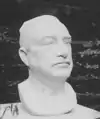 Duke of Portland
Duke of Portland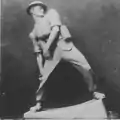 Grenade Thrower
Grenade Thrower Man Handling
Man Handling National Library of Scotland
National Library of Scotland Scottish coat of arms - location unknown
Scottish coat of arms - location unknown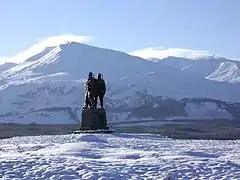 Commando Memorial, Spean Bridge
Commando Memorial, Spean Bridge Black Watch Memorial, Powrie Brae near Dundee
Black Watch Memorial, Powrie Brae near Dundee Black Watch Memorial, view from rear
Black Watch Memorial, view from rear Black Watch Memorial, plaque
Black Watch Memorial, plaque Boxers
Boxers Robert Burns, Arbroath.
Robert Burns, Arbroath. Cutty Sark, Inverbervie
Cutty Sark, Inverbervie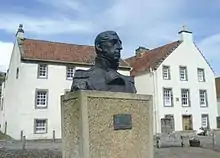 Admiral Cochrane, Culross
Admiral Cochrane, Culross Plaque in Dowding Memorial, Moffat
Plaque in Dowding Memorial, Moffat Dowding panel
Dowding panel Royal Observer Corps. Trophy
Royal Observer Corps. Trophy Plaque commemorating the old town house which was demolished to make way for the Caird Hall
Plaque commemorating the old town house which was demolished to make way for the Caird Hall Mercat Cross, Dundee
Mercat Cross, Dundee Weathered unicorn and its replacement
Weathered unicorn and its replacement Mercat Cross Unicorn
Mercat Cross Unicorn Rugby Tackle
Rugby Tackle Alayne
Alayne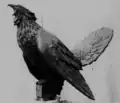 Kenmore Capercaillie
Kenmore Capercaillie Sprinters
Sprinters Footballers
Footballers Mona Memorial, Broughty Ferry Lifeboat Station.
Mona Memorial, Broughty Ferry Lifeboat Station. Plaque on a memorial to workers who died during the construction of the Tay Road Bridge
Plaque on a memorial to workers who died during the construction of the Tay Road Bridge High jump
High jump
References
- https://sculpture.gla.ac.uk/view/person.php?id=msib6_1210948778 Scott Sutherland - Mapping Sculpture- University of Glasgow
- War diary of the Fifth Seaforth Highlanders by Captain David Sutherland MC,TD, published by John Lane,The Bodley Head
- John o'Groat Journal 21/10/1938
- Northern Ensign, 23rd June 1926, p.6
- https://www.webcitation.org/5ooYiQaxP?url=http://www.drawpaintsculpt.com/artist-biographies/scott-sutherland/ LARA - archived biography
- The Scotsman - Wednesday 24 April 1940 p.11
- Army No. 1489239
- Aberdeen Weekly Journal, April 27, 1944, p. 4
- Belfast News-Letter - Saturday 24 November 1945, p. 4
- The Courier and Advertiser, February 26, 1947
- The Scotsman - Friday, October 28, 1949 p. 4
- Dundee Courier - Monday 29 September 1952 p. 3
- http://www.dday.center/d-day-review-musee-no-4-commando-ouistreham.html Musée No. 4 Commando
- The Press and Journal, Tuesday, September 14, 1982, p. 5
- St. Andrews Citizen - Saturday 21 February 1953 p. 5
- The Brechin Advertiser, April 6, 1954, p. 5
- "General view of Town House, High Street from North-West". Canmore. Retrieved 2020-03-15.
- Aberdeen Evening Express - Saturday 24 January 1959 p. 10
- Brechin Advertiser - Tuesday, 13 October 1959 p. 8
- Aberdeen Press and Journal - Thursday 02 October 1969 p. 1
- Aberdeen Press and Journal - Thursday 02 March 1972 p. 2
- Aberdeen Press and Journal - Tuesday 08 July 1997 p. 41
- "Norie-Miller Park - Perth City Centre". perthcity.co.uk. Retrieved 2020-03-15.
- "The Unicorn". Art UK. Retrieved 2020-03-15.
- http://warmemscot.s4.bizhat.com/warmemscot-post-20870.html The Scottish Military Research Group - Commemorations Project
- Aberdeen Press and Journal - Monday 04 September 1978 p. 6